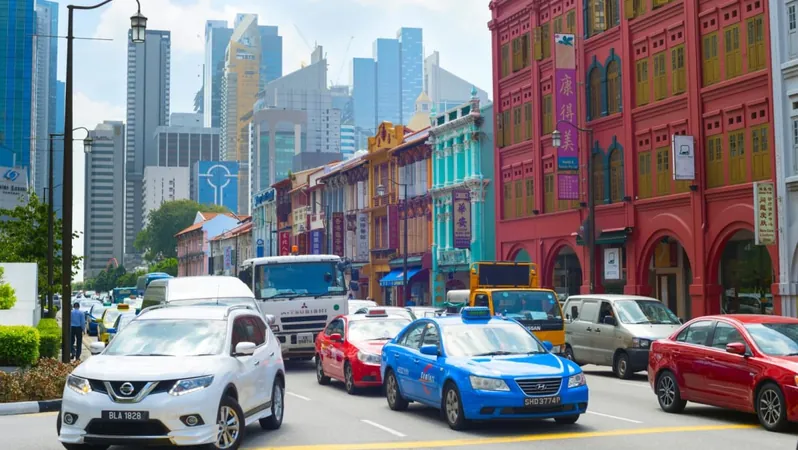
Major Hike in Ride-Hailing Platform Fees in Singapore Set for January 2025
2024-12-24
Author: Mei
Overview of Fee Increases
As of January 1, 2025, several ride-hailing services in Singapore, including Grab, Gojek, ComfortDelGro (CDG Zig), and TADA, will be raising their platform fees by up to S$0.50 (approximately US$0.37), a move that is largely attributed to the implementation of the upcoming Platform Workers Act.
Grab's Fee Adjustment
Grab, the most predominant ride-hailing service in Singapore, announced that it will increase its platform fee from S$0.70 to S$0.90 for passengers. The hike, referred to as the "platform & partner fee," is intended to bolster contributions to the Central Provident Fund (CPF), improve work injury compensation (WIC) coverage, and enhance other welfare initiatives for their drivers. In addition, the fee adjustment aims to fund ongoing platform maintenance and service enhancements. Furthermore, the fees for their food, grocery, and parcel delivery services will also rise, moving from S$0.40 to S$0.60.
Changes from Gojek and ComfortDelGro
In addition, Gojek will implement a fee increase of S$0.30 to S$0.50 per trip. The company explained that this change aims to protect drivers' earnings while supporting the new legislation and maintaining high-quality services.
ComfortDelGro, Singapore's largest taxi operator, will also see a fee increase, charging commuters between S$1.00 and S$1.20 per trip, depending on factors like distance and travel time. This marks an increase from the flat rate of S$0.70 that commuters have been accustomed to. The additional funds will contribute to enhanced protection and welfare initiatives under the Platform Workers Bill, with ComfortDelGro's Chief Executive, Mr. Tommy Tan, emphasizing the commitment to creating a more rewarding and secure future for drivers.
TADA's Fee Increase and Commuter Concerns
TADA has also confirmed it will increase its platform fee by S$0.50 per trip, excluding GST. The company stated that this adjustment is essential for maintaining and improving the ride-hailing experience while also supporting the government’s Platform Workers Bill.
Market Response and Future Implications
In light of these changes, many commuters are left wondering how daily transportation costs will be affected. Market analysts have noted that this rise in fees may compel users to rethink their transportation options, potentially boosting the popularity of public transport as a more cost-effective alternative.
As the ride-hailing sector adjusts to these new regulations aimed at improving worker welfare, questions remain on how other services, such as Ryde, will respond. As of now, it is unclear whether Ryde will follow suit with similar fee increases.
Conclusion
Stay tuned for more updates on how these changes will impact everyday commuters and the ride-hailing landscape in Singapore!
 Brasil (PT)
Brasil (PT)
 Canada (EN)
Canada (EN)
 Chile (ES)
Chile (ES)
 España (ES)
España (ES)
 France (FR)
France (FR)
 Hong Kong (EN)
Hong Kong (EN)
 Italia (IT)
Italia (IT)
 日本 (JA)
日本 (JA)
 Magyarország (HU)
Magyarország (HU)
 Norge (NO)
Norge (NO)
 Polska (PL)
Polska (PL)
 Schweiz (DE)
Schweiz (DE)
 Singapore (EN)
Singapore (EN)
 Sverige (SV)
Sverige (SV)
 Suomi (FI)
Suomi (FI)
 Türkiye (TR)
Türkiye (TR)